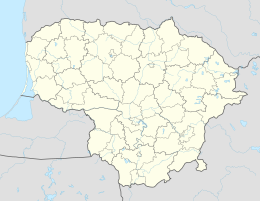Tauragė
| Tauragė | |||
|
|||
| State : |
|
||
| Municipality : | Tauragė Rajong Parish | ||
| Coordinates : | 55 ° 15 ′ N , 22 ° 17 ′ E | ||
| Area (place) : | 15.7 km² | ||
| Inhabitants (place) : | 30,000 (2005) | ||
| Population density : | 1,911 inhabitants per km² | ||
| Time zone : | EET (UTC + 2) | ||
| Telephone code : | (+370) +370 | ||
| Postal code : | LT-72253 | ||
|
|
|||
Tauragė (German Tauroggen ) is a town with about 30,000 inhabitants and the seat of the Rajongemeinde Tauragė in southwest Lithuania on the Jūra River . It is also the capital of one of the 10 districts ( Apskritys ) in the country. The city is located on the road connecting Kaliningrad and Riga .
history
The city was first mentioned in 1507 in connection with the construction of a church. From 1691 to 1793, Tauroggen and Serrey belonged to Prussia following the marriage of Margrave Ludwig von Brandenburg to Princess Luise Charlotte von Radziwill . Because of its isolated location as an enclave in Lithuania, which was still connected to Poland at that time, it was ceded to Poland- Lithuania as "compensation" for the second partition of Poland , but fell to Russia as early as 1795 as part of the third partition , which it until independence Lithuania remained in 1918.
By on December 30, 1812 between the Prussian Lieutenant General Johann David von Yorck and the Russian Major General Hans von Diebitch closed Convention Tauroggen the place has gone down in the history books. The separation of the Prussian auxiliary corps from the French army, agreed there, initiated the wars of liberation .
In 1836 much of the city was destroyed by fire. Honoré de Balzac stayed in Tauroggen in 1843 with his lover Ewelina Hańska .
In the First World War , after winning the winter battle in Masuria, German troops occupied Tauroggen in February 1915, had to give it up to the Russians on March 18 and recaptured it on March 29. Significant parts of the urban infrastructure fell victim to the fighting. On September 9, 1927, the population rebelled against the rule of the Lithuanian President Antanas Smetona , but the revolt was quickly put down. After the Soviet occupation of Lithuania in 1940, Tauroggen Castle was used to intern Lithuanian dissidents and Polish prisoners of war . Many residents of the village, including Roman Abramovich's parents and relatives , were deported to the Gulag by the Soviet NKVD in 1940 . That saved this and other Jewish families from the Holocaust . After the German attack on the Soviet Union on June 22, 1941, the Soviets withdrew and Tauroggen was occupied by the German Wehrmacht on the same day . Over 4,000 Jews were murdered in Tauroggen and the surrounding areas. In autumn 1944, the German occupation ended with the renewed occupation by the Soviet Union, which lasted until 1990.
Town twinning
Sports
The FK Tauras Tauragė is the most important football club in the city.
media
- Tauragė TV tower
- Televizijos Komunikacijos - local station that can be received in the region in and around Tauragėn.
Personalities
- Mari Aldon (1925-2004), Lithuanian-American actress
- Bronislovas Jagminas (* 1935), politician and journalist
- Antanas Zenonas Kaminskas (* 1953), politician
- Vilija Aleknaitė-Abramikienė (* 1957), pianist and politician
- Vaclovas Karbauskis (* 1958), politician
- Violeta Boreikienė (* 1960), politician
- Robertas Piečia (1966), forester and politician
- Nerija Putinaitė (* 1971), philosopher and politician
- Remigijus Šimašius (* 1974), lawyer and politician
- Ernestas Šetkus (* 1985), football player
- Akvilė Stapušaitytė (* 1986), badminton player
- Živilė Jurgutytė (* 1987), handball player
Individual evidence
- ↑ Edmundas Mažrimas: Prancūzų rašytojas Onore de Balzakas ir Tauragė . Tauragės kurjeris. June 26, 2008. Archived from the original on March 7, 2009. Retrieved March 13, 2010.
- ^ Meyer's Large Conversational Lexicon . War addendum. 1st part . Bibliographisches Institut, Leipzig, Vienna 1916, p. 202 f.
- ↑ TVK homepage. In: tvk.lt. Retrieved January 17, 2015 .





